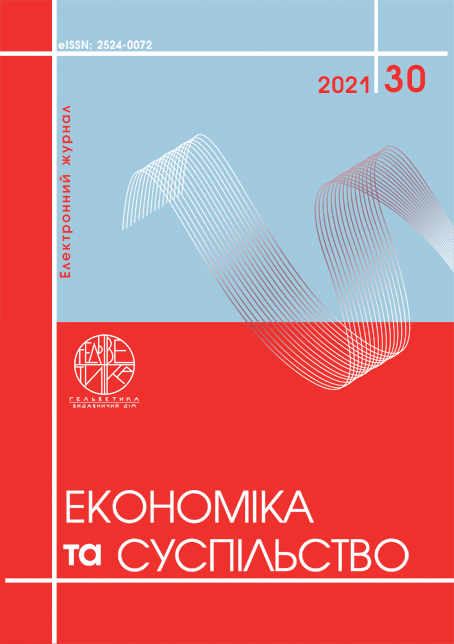FEATURES OF THE ANTI-CRISIS MANAGEMENT PROGRAM IN THE PROCESS OF ECONOMY GLOBALIZATION
Abstract
The article is devoted to the anti-crisis format of business management in the context of globalization changes in the world economy. The basic conceptual principles of crisis management are specified. The author's approach to understanding the properties and features of the crisis management program, which should be the main component of the socio-economic system: the author believes that it is necessary to take into account not only properties such as integrity, integrativeness, communication, hierarchy, but also dynamism and orderliness. Crisis management is a management system that is comprehensive and aimed at preventing crises and identifying the causes of the crisis. The article formulates the main conditions that ensure the effective improvement of the crisis management program of the enterprise. The main components that characterize the effectiveness of the crisis management program of the enterprise are identified. Based on the current state of the economy in the process of globalization, measures are proposed to improve it. The implementation necessity of preventive anti-crisis management is emphasized at the domestic enterprises activity due to the presence of unfavorable tendencies in the economic environment. The goals of the anti-crisis strategy implementation have been determined. The problems that arise in the process of tactical preventive anti-crisis management are generalized. The essence of the stages of the anti-crisis management process (pre-crisis stage, crisis stage and post-crisis stage) is revealed. The procedure of anti-crisis management is proposed and the choice of anti-crisis management instruments is substantiated. The anti-crisis management program should reflect the system of development and implementation of a set of measures aimed at management in the current crisis. The anti-crisis management program should take into account not only the timely diagnosis of the crisis situation, but also the analysis of the causes of its occurrence, determine the system of measures for functioning in crisis conditions, as well as the plan to overcome it and prevent future crises.
References
Baubion Charles. OECD Risk management: Strategic Crisis Management. Working Papers on Public Governance. OECD. 2018. no. 23. 24 p.
Романяк Г.М. Сутність антикризового управління підприємством в умовах нестабільного ринкового середовища. Наукові записки Української академії друкарства. 2016. № 1. С. 235–239. URL: http://nbuv.gov.ua/UJRN/Nz_2016_1_31
Ладунка І.С., Андрюшина О.І. Антикризове управління підприємством. Економіка і суспільство. 2017. Випуск 8. С. 278–281.
Коюда В.О. Управлінські рішення в системі антикризового управління підприємством Науковий вісник Полтавського університету економіки і торгівлі. 2019. № 1 (52). С. 153–159.
Simola S. Teaching corporate crisis management through business ethics education. European Journal of Training and Development. 2014. Volume 38(5). P. 485–503.
Давиденко Н.М. Антикризове фінансове управління на підприємстві. Науковий вісник Національного університету біоресурсів і природокористування України. Серія : Економіка, аграрний менеджмент, бізнес. 2015. Випуск 211(1). С. 76–80. URL: http://nbuv.gov.ua/UJRN/nvnau_econ_2015_211%281%29__17
Coombs W.T. Ongoing Crisis Management: Planning, Managing and Responding. 3rd ed. Thousands Oak: Sage. 2012.
Шевчук В. В. Використання превентивного антикризового управління для стабілізації ринкової позиції підприємства. Бізнесінформ. 2019. № 5. С. 264–268.
Jereb Borut, Wrzalik Artur. Use of Expert Systems in Crisis Management. CzOTO. 2019. Volume 1 (1). Р. 406–411.
Сажієнко С.А. Роль антикризового управління в запобіганні банкрутства підприємств. Вісник Хмельницького національного університету. 2019. Випуск 6 (2). С. 52–55.
Zamoum Khaled, Gorpe Tevhide Serra. Crisis Management: A Historical and Conceptual Approach for a Better Understanding of Today’s Crises. IntechOpen. 2018. P. 203–217. DOI: http://dx.doi.org/10.5772/intechopen.76198
Baubion, Charles (2018). «OECD Risk management: Strategic Crisis Management». Working Papers on Public Governance. OECD. No. 23.
Romanyak G.M. (2016) The essence of crisis management of an enterprise in an unstable market environment. Naukovi zapysky Ukrayinsʹkoyi akademiyi drukarstva, 1, 235–239. Available at: http://nbuv.gov.ua/UJRN/Nz_2016_1_31
Ladunka I.S., Andryushyna O.I. (2017) Enterprise crisis management. Ekonomika i suspilʹstvo, 8, 278–281.
Koyuda V.O. (2019) Management decisions in the enterprise crisis management system. Naukovyy visnyk Poltavsʹkoho universytetu ekonomiky i torhivli,1 (52), 153–159.
Simola S. (2014) Teaching corporate crisis management through business ethics education. European Journal of Training and Development, 38(5), 485–503.
Davydenko N.M. (2015) Anti-crisis financial management at the enterprise. Naukovyy visnyk Natsionalʹnoho universytetu bioresursiv i pryrodokorystuvannya Ukrayiny. Seriya: Ekonomika, ahrarnyy menedzhment, biznes, 211(1), 76–80. Availableat: http://nbuv.gov.ua/UJRN/nvnau_econ_2015_211%281%29__17
Coombs W.T. (2012) Ongoing Crisis Management: Planning, Managing and Responding. 3rd ed. Thousands Oak: Sage.
Shevchuk V.V. (2019) The use of preventive crisis management to stabilize the market position of the enterprise. Biznesinform, 5, 264–268.
Jereb, Borut and Wrzalik, Artur (2019) Use of Expert Systems in Crisis Management. CzOTO, 1 (1), 406–411.
Sazhiyenko S.A. (2019) The role of crisis management in preventing bankruptcy of enterprises. Visnyk Khmelʹnytsʹkoho natsionalʹnoho universytetu, 6 (2), 52–55.
Zamoum, Khaled and Gorpe, Tevhide Serra. (2018). Crisis Management: A Historical and Conceptual Approach for a Better Understanding of Today’s Crises». IntechOpen, 203–217. DOI: http://dx.doi.org/10.5772/intechopen.76198


